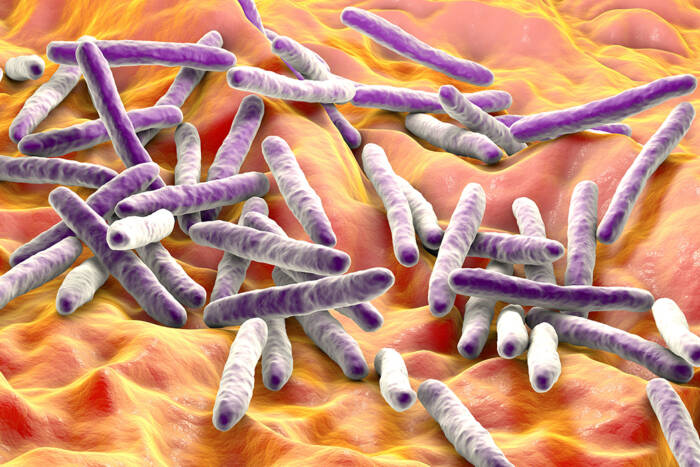"Good Citizens" in the Immune System Carry Out State's Orders
Diversity in PKC signaling enzymes yields clues to tolerance

Mice lacking the enzyme PKC-delta (left) demonstrate an increase in size and number of lymphoid follicles in the spleen, indicating expansion of B cells in the presence of self-antigen. Mice with the PKC-delta enzyme (right) demonstrate quiescent B cells in the same lymphoid follicles in the spleen, indicating a tolerant response to self.
The difference between good and evil matters as much in the immune system, it turns out, as it does to humankind. The problem is understanding how the immune system’s cells perceive the difference. In the April 25 issue of the journal Nature, a team of researchers led by Rockefeller University immunologist Sasha Tarakhovsky, Ph.D. show that a single enzyme present in B cells may provide a major piece of the puzzle.
Studying a family of ubiquitous enzymes, called PKCs or protein kinase C’s, Ingrid Mecklenbräuker, a postdoctoral fellow in Tarakhovsky’s lab and first author of the current paper, identified one variation, or isoform, of the enzyme that keeps B cells sensitive to self-antigens.
As a result of this sensitivity, the B cells, in effect, do not respond to self-antigens, which prevent the cells from producing autoreactive antibodies. In other words, the B cells remain tolerant of self-antigens and keep the body from attacking itself. However, without the enzyme, called PKC-delta, the B cells don’t perceive the self-antigens as self, and start producing anti-self antibodies. This process triggers an immune response equivalent to an attack on the body’s own cells.
The finding, based on studies of mice genetically engineered to not make the specialized enzyme, help us understand the mechanisms of autoimmune disorders such as lupus. The research also could serve as the basis for a diagnostic marker for auto-immunity disorders.
Besides the relevance to improving diagnosis of autoimmune disorders, which collectively affect five percent of the population – about 14 million people – in this country, the basic research reveals one of the ways immune cells generate biochemical messages that lead to discriminating responses in the immune system.
“The immune cells in our body function as citizens of an organized state,” says Tarakhovsky, an associate professor and head of laboratory at Rockefeller. “Their entire life concentrates on the interests of the state with the focus on perception of the signals important to state function. PKCs seem to vary in what activity they tell B cells to carry out.”
There are about 14 known PKC enzymes, which work in many of the body’s cell types. For many years scientists were puzzled by the physiological meaning of the PKCs diversity.

Associate Professor Sasha Tarakhovsky (center), working with Postdoctoral Fellow IngridMecklenbräuker (right), Research Associate Kaoru Saijo and Research Assistant Nai-Ying Zheng (not pictured) of Rockefeller University, has achieved greater insight on the function of PKC-delta as an essential component of a signaling pathway that leads to tolerance in B cells.
Though not all of the 14 PKCs have been “knocked-out” in mice in order to test the effects of their absence, a few have.
One in particular, called PKC-beta, has been studied by Tarakhovsky and his colleagues. In an earlier publication, the scientists revealed that PKC-beta plays an essential role in B cell responses to the antigens present in pathogenic organisms. However, B cell responses to self-antigens were unaffected by PKC-beta deficient animals.
Tarakhovsky’s lab focuses on how immune cells generate biochemical messages that lead to the different types of immune cell responses to antigenic stimulation. This work is helping scientists understand the immune mechanism of tolerance to self-antigens.
Tolerance, one of the important topics in basic science research in immunology, is one way that the body confers immunity.
Because they are exposed to a variety of antigens, B cells exist in a constant crisis mode, where they must distinguish between good (antigens) and evil (self-antigens). In the presence of antigens and the appropriate chemical messages, B cells produce antibodies, the “lock” part of the lock-and-key mechanism that targets foreign invaders to be eliminated by other killer and clean-up cells in the immune system.
But in the presence of the millions of antigens in the body, scientists know that self-reactive B cells’ altruistic gesture is to either die by a process called apoptosis or to become anergic, tolerating self-antigens without triggering an attack. The non-self reactive B cells develop further and guard the body from pathogens. PKC-delta’s chemical effect on B cells prevents them from mounting an offensive to self-antigens.
Tarakhovsky, working with Mecklenbräuker, Research Associate Kaoru Saijo and Research Assistant Nai-Ying Zheng of Rockefeller in this current publication, have achieved greater insight on the function of PKC-delta as an essential component of a signaling pathway that leads to tolerance in B cells.
This research was supported by the Irene Diamond Foundation, a grant from the National Institutes of Health, the S.L.E. Foundation and The Rockefeller University’s Women & Science Fellowship Program.


